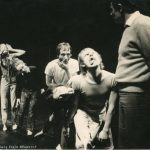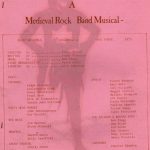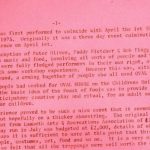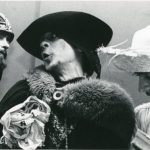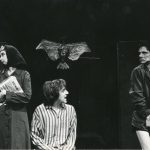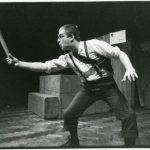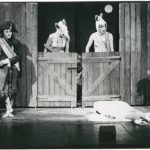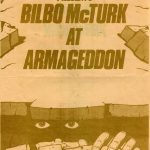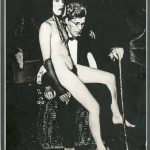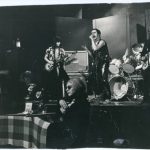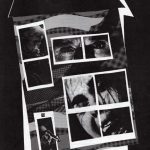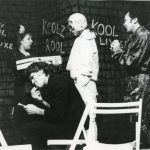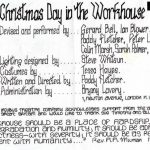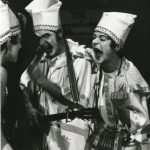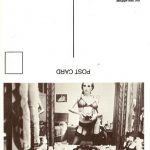Company name: Incubus Theatre Company
Founders: Paddy Fletcher, John Abulafaia (see John Abulafaia on the Incubus early years and Paddy Fletcher)
Established: 1968
Reason: The company began with a group of students and ex-students from Brighton Arts College and Brighton University, and two productions at the Sunday Times National Union of Student’s Drama Festival – Kafka’s Metamorphosis and The Amazing Harold Show. One was a complete success and the other a disaster. From this experience Incubus believed they had something going for them and took both shows on the road.
Current status: Disbanded mid 1980s
Area of Work: Experimental: new writing, street theatre and festivals
Policy: To entertain and to bring the excitement of theatre to the widest possible audience
Structure: Writer/director-led by Paddy Fletcher, with actors who’s presence fluctuated but whose key players included: Patti Bee, Gerard Bell, Ian Blower, Orde Brown, John Grant, Su Elliott, Peter Leabourne, Andy Lipman, Colin Marsh and Pippa Sparkes. Bryony Lavery was their administrator in the early 1970s. Designs and other key contributions by Lize Spenz.
Based: London
Funding: Arts Council project funding
Performance venues: Pub theatres, art festivals, fairs, street theatre, small-scale touring venues, Oval House, Round House. Holland, including De Lantaren in Rotterdam, Germany, Greece, France and Switzerland.
Audiences: Adult audiences, particularly those who didn’t have too many preconceptions of what theatre should be.
Company work and process: Incubus was formed in 1968, by John Abulafaia and Paddy Fletcher, consisting primarily of students and ex-students from Brighton’s Arts College and University. With John as director, they entered two productions into the Sunday Times National Union of Students Drama Festival, one of which was Paddy’s first play, The Amazing Harold Show, and an adaptation of Kafka’s Metamophosis. The mixed response to each play, one good, one bad, encouraged them and they took the shows off on tour. The following year, after a failed trip to the Edinburgh Festival with John Abulafaia’s play Brain, John took a job with a ‘proper’ theatre company and departed, leaving Paddy in charge with £30 in the bank.
Paddy had at that time received a small inheritance, which gave him just enough money to survive for a couple of years, and enabled him to takeover and run Incubus. From the start, Paddy led the company as director, writer and actor. Other company members were found through friends, borrowing from other companies, ads in Time Out and from whoever wanted to be involved. Some stayed for a short time, others for many years.
It was Paddy’s desire to entertain people. The fringe movement was just emerging and it was a good to time experiment and play. ‘Actors play, playing its called – people forget that’ (Paddy Fletcher). The company began from scratch. With no formal training they experimented with what worked and what didn’t, learning from their failures; trying out different ways of doing things in rehearsal, working with different plays, improvising plays. Much of this was done at Oval House under Peter Oliver’s creative policy of the ‘right to fail’, and after 3 or 4 productions they began to settle into a company way of working.
They got a van: ‘Very important – hole in the floor, third-hand rust bucket’ (Paddy Fletcher), and began touring. They took bookings wherever they could get them – universities, Oval House, Edinburgh Festival and developed a circuit of gigs throughout the country – in the early days performing for nothing or small fees.
1973 was a breakthrough year, when Peter Oliver asked them to do the Feast of Fools at the Oval House involving a number of people and companies resident there. It ran originally for 3 nights but was so successful, revived for another two weeks, which at that time was Oval House’s longest running show. The performers included a young Pierce Brosnan. It was at this time they received their first Arts Council grant. Feast of Fools was then invited to the Round House as a Christmas show, but this didn’t fair so well, ‘lots of egos at play’ (Paddy Fletcher).
Street and festival work
Incubus were well-known for their street and festival work. In fact their time was split between these and doing plays. The company’s energy and attack came very much from doing street and open air performances, along with their ‘rock and roll attitude’. It also taught them how to interact with people in their stage performances.
They would decide on a set of characters, choose costumes, maybe learn a couple of songs and set off for a festival, staying in character, improvising with the public for two to three days at a time. At one East Anglian Albion Fair, called the Fairy Fair, they created a group called ‘The Goblins’ who sat in a hole drinking beer for two days, insulting everybody who came their way. Another time they were a family called ‘The Awfuls’ – ‘ a dreadful, ignorant family’. Paddy had his own beggar character who would follow people around, insulting them until they gave him some money, which he would then go off and spend in the beer tent – all in character naturally!
Paddy more often that not mixed historical themes and settings with the present day, as was seen in, Gibbon’s Decline and Fall of the Roman Empire, Joanna Southcott’s Box and The Golden Ass.
A flavour of their style can be grasped from this publicity notice in an Oval House programme advertising Soon Maybe Boogie (1978):
‘Featuring Mrs Ivy Gorringe, the blind widow of ex-Mosleyite Blackshirt, Neville Gorringe, his aging delinquent son, Terry, and the extra-terrestrial, guerilla rock band, ‘The Iron Jelloids’. Soon Maybe Boogie is Incubus Theatre Company’s Tenth Anniversary production. In the course of one evening, but not necessarily in this order, the ashes of Neville Gorringe attain consciousness, the Jelloid’s lead singer is killed by an electric shock, Terry Gorringe is jerked from his apolitical topor into full maturity, and right wing muscle combines with outer space know-how.’
Europe
Incubus spent a month of each year in Holland where they were very popular. Other tours took them to Germany, France and Switzerland. At De Lantaren, Rotterdam they teamed up with the local Exit Theatre company to create a Medieval acting school. Another time they were involved in a street parade in the centre of the city where a donkey was hired for the ‘Pope’s’ entry, accompanied by a choir in white surplices carrying torches. The ‘Pope’ was Liberace-style with white lipstick, which didn’t go down too well with the Catholics of Rotterdam. These are just two examples of the many one-off performances they were invited to create in many varied locations.
Audiences
They had pockets of enthusiastic supporters up and down the country and were especially welcome in Scotland, East Anglia and the West Country. In London they struggled to have their work taken seriously and in the some quarters they were criticised for being sexist, occasionally racist, some of which, Paddy feel’s was probably deserved. Incubus were a ‘touring company who used dark humour to make people laugh and think, but laugh first’. Some shows had serious undertones, for example, the Old Testament Floor Show which was set in nuclear fall-out sheleter and contained elements of protest against the nuclear arms race, and nuclear weapons in general.
Finishing up
During the last two years of the company’s life Paddy took time off to work with ATC. whilst other writers and directors led the company work. The Arts Council became difficult in terms of what they thought the company should and should not be doing, and eventually they lost there funding.
Personal appraisal & thoughts:
Paddy Fletcher (2013): ‘If the audience looked as if they were going to be noisy, we’ do the show quicker and louder, it was kind of Rock and Roll theatre.’
‘I have been, and still am, very interested in history, and the way things, six hundred years ago, a thousand years ago affect us now. So I mash all different kinds of time periods together. I like to do that.’
Reviews:
Revenger’s Comedy
‘It’s multi-layered, always precise comedy dialogue managed to pull it out of the cul-de-sac of measured outrageousness that this sort of work can typify.’ (Performance Magazine)
Productions:
| PRODUCTION NAME | VENUES | DATES |
|---|---|---|
| Metamorphosis Writer: Franz Kafka Director: John Abulafaia | 1968 | |
| The Amazing Harold Show Writer: Paddy Fletcher | 1968 | |
| An Account of the Marriage between August Strindberg and Harriet Bosse by John Abulafaia | Royal Court Upstairs | March 1969 |
| Mime Play | Brighton Arts festival at Brighton Combination | |
| Feast of Fools Writers: Paddy Fletcher and Bob Flagg | Oval House, The Roundhouse | 1973 |
| Fanfare for Europe Writer: Paddy Fletcher | The King's Head Theatre | 1973 |
| Dr. Doome's Living Waxworks Writer: Paddy Fletcher | Edinburgh Festival Fringe | 1974 |
| Gibbon's Decline and Fall of the Roman Empire Writer: Paddy Fletcher | ||
| Joanna Southcott's Box Writer: Paddy Fletcher | 1975 | |
| Christmas Day inthe Workshouse, company devised | ||
| Soon Maybe Boogie Writer: Paddy Fletcher | ||
| The Golden Ass Written by: Lucien Apuleius, adapted Paddy Fletcher | 1980 | |
| The Old Testament Floor Show Writer: Paddy Fletcher | 1981 | |
| Cozeenook Writer: Paddy Fletcher | 1981 | |
| Hendersons on Sunday Writer: Paddy Fletcher | 1981 | |
| The Revengers Comedy Writer: Paddy Fletcher | 1982 | |
| Songs for Passing Strangers Writer: Paddy Fletcher | 1982 | |
| The Three Sisters Go to Moscow Writer: Paddy Fletcher | 1983 | |
| Into The Garden Writer: Paddy Fletcher | 1983 | |
| Doomsday Decameron Writer: Paddy Fletcher | Sackville Theatre, Sevenoakes | 1984 |
| The Secret Agent Writer: Joseph Conrad, adapted Jonathan Petherbridge | 1984 |
Interviewee reference: Paddy Fletcher, Bryony Lavery, Su Elliott, Pippa Sparkes, Emil Wolk
Links:
Paddy Fletcher with Footsbarn
See also Les Oeufs Malades who were composed of many ex-Incubi
Existing archive material: Paddy Fletcher
Reason for disbanding: Loss of Arts Council Funding
Bibliography:
Unpublished plays by Paddy Fletcher include:
The Amazing Harold Show
The Golden Ass
Victoria and the Values!
Master Phineas de la Zouche’s Medieval Theatre
Gibbon’s Decline and Fall of the Roman Empire
Soon Maybe Boogie
Kool
Joanna Southcott’s Box
Acknowledgements: This page was drawn together by Xi-mali Kadeena and Jessica Higgs with material taken from Xi-mali’s interview with Paddy Fletcher, to whom we are very grateful. November 2013
The creation of this page was supporter by the National Lottery through the Heritage Lottery Fund.

